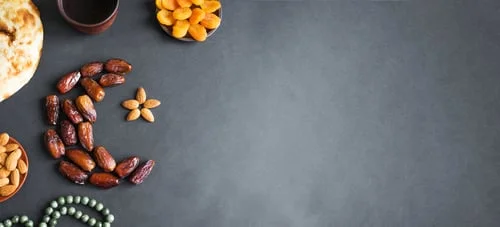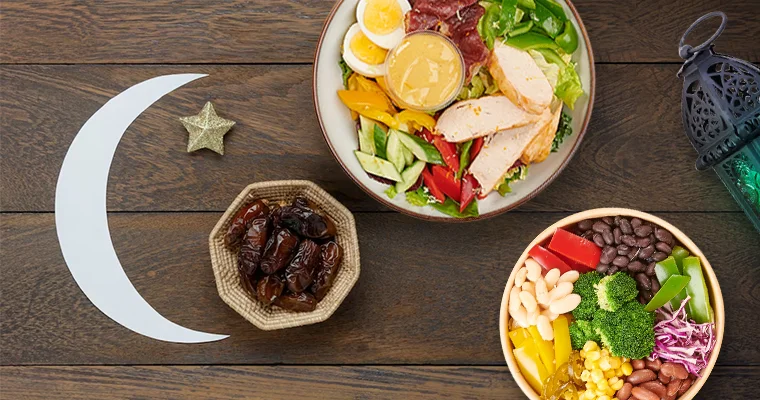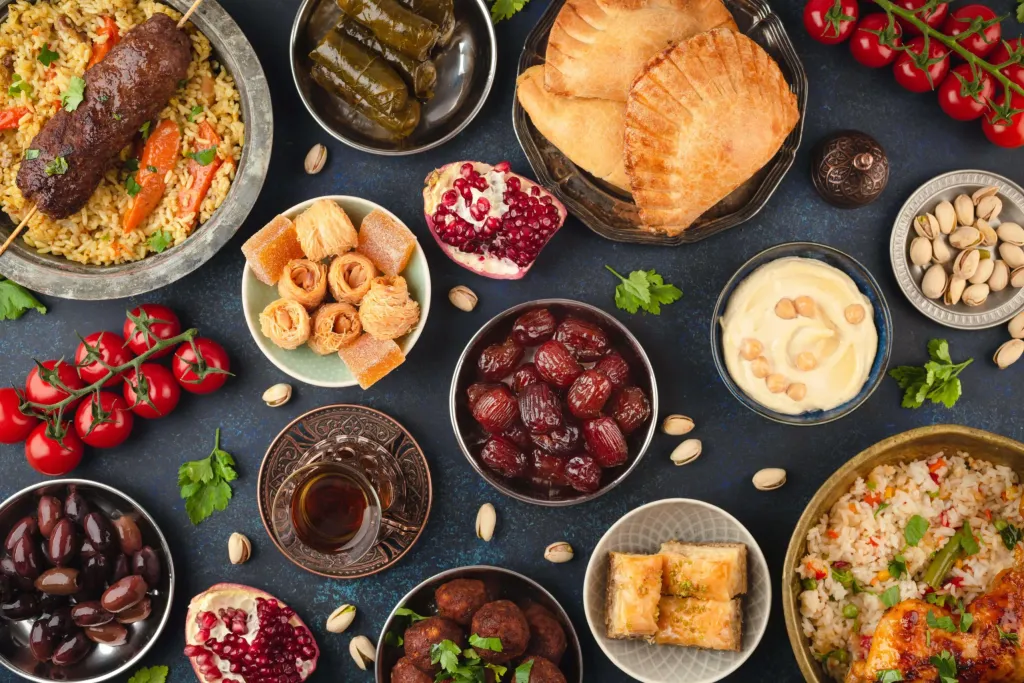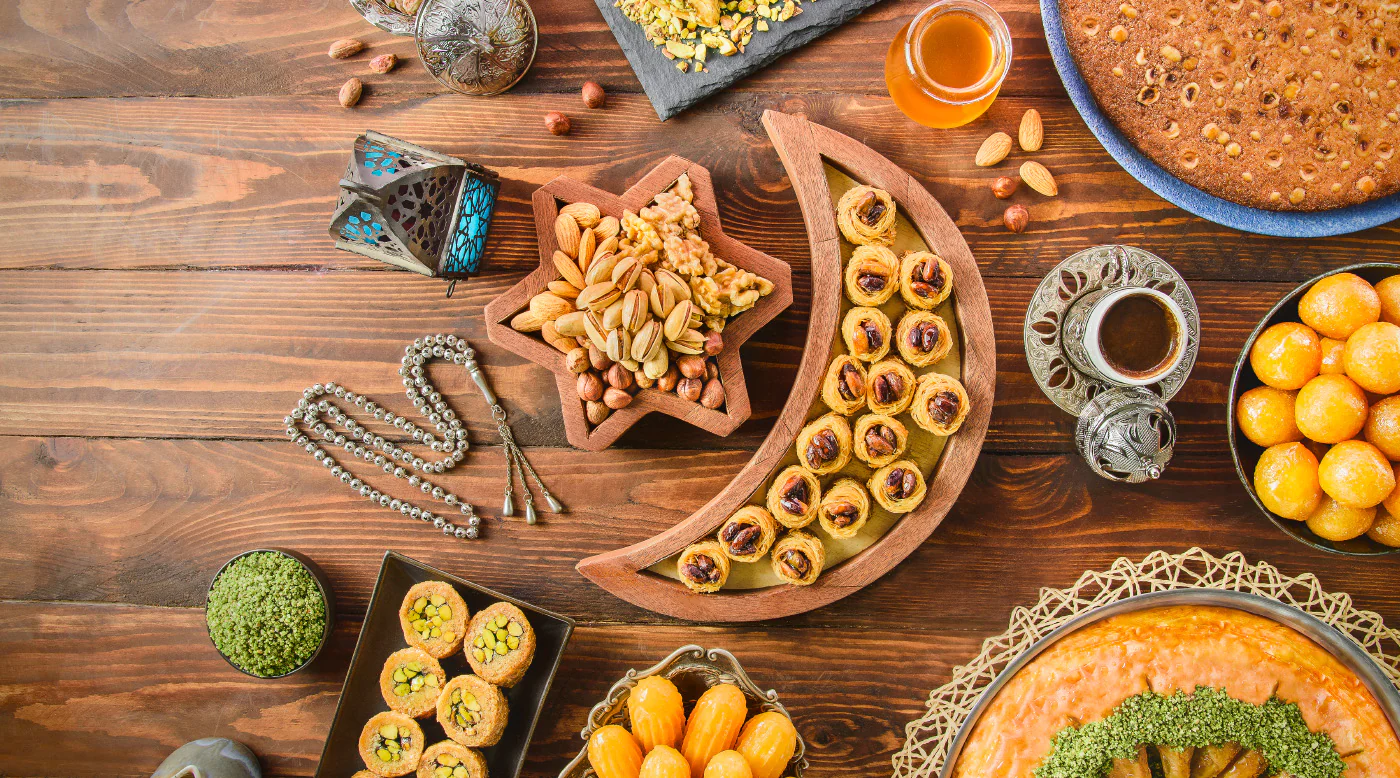Ramadan is a special time for Muslims worldwide, marked by fasting from dawn until sunset. It’s not just about abstaining from food and drink; it’s also about nourishing the body with wholesome foods and avoiding those that may cause discomfort. In this guide, we’ll explore what to eat and avoid during Ramadan fasting, making it easier for individuals to stay healthy and energized throughout this sacred month.
Understanding Ramadan Fasting

During Ramadan fasting, Muslims don’t eat or drink anything from sunrise to sunset. This means no food, drinks, smoking, or intimate relations during these hours. It’s a special time for Muslims to connect spiritually with Allah. They spend their days reflecting on their faith, showing self-control, and becoming closer to their religion. This practice helps them focus on their prayers and develop a stronger bond with their beliefs. Overall, Ramadan fasting is a time of spiritual growth and dedication to Allah.
Importance of Nutrition During Ramadan

During Ramadan, it’s crucial to eat the right foods to stay healthy and energized throughout the day. Balanced meals provide the nutrients needed to keep energy levels up and prevent tiredness, dehydration, and nutrient deficiencies. Foods rich in carbohydrates, such as grains, fruits, and vegetables, release energy slowly, keeping you full for longer periods. Including protein sources like meat, fish, eggs, and legumes helps repair and build muscles. Hydrating with plenty of water and fluids during non-fasting hours is also important to prevent dehydration. Additionally, incorporating fruits and vegetables into meals provides essential vitamins, minerals, and fiber for overall health. By focusing on balanced nutrition, individuals can ensure they have the energy and nutrients they need to sustain them throughout the fasting period while staying healthy and strong.
Suhoor: The Pre-Dawn Meal

Suhoor, the pre-dawn meal before starting the fast, is crucial for providing the energy needed to sustain through the day. It should consist of foods that release energy slowly, like whole grains, oats, and brown rice. Protein-rich foods like eggs, yogurt, and nuts help keep you feeling full and provide essential nutrients for your body. Including healthy fats from sources like avocado or olive oil can also help maintain energy levels. It’s important to hydrate well during Suhoor by drinking plenty of water and fluids to prevent dehydration during the day. Fruits and vegetables are also great options as they provide vitamins, minerals, and fiber. Overall, a balanced Suhoor meal ensures that your body is nourished and hydrated to tackle the fasting period with energy and vitality.
Iftar: The Breaking of the Fast
Iftar, the meal to break the fast at sunset, is eagerly anticipated after a day of fasting. It begins traditionally with dates and water, which provide a quick source of glucose to replenish energy levels and hydrate the body. These are followed by a balanced meal that includes carbohydrates, protein, and vegetables. Carbohydrates like rice or bread help replenish energy stores, while protein from sources like chicken or lentils promotes muscle recovery and repair. Including vegetables ensures that your meal is nutritious and provides essential vitamins and minerals. It’s important to eat slowly and mindfully during Iftar to avoid overeating after a day of fasting. Additionally, drinking plenty of fluids throughout the evening helps rehydrate the body after a day without water. Overall, Iftar is a time to enjoy a nourishing meal with family and friends, celebrating the end of the day’s fast and giving thanks for the blessings of the day.
What to Eat During Ramadan:-
Complex Carbohydrates:
Whole grains like brown rice, whole wheat bread, and oats are excellent sources of complex carbohydrates. These foods provide sustained energy release, keeping you feeling full and energized throughout the day. Unlike simple carbohydrates found in sugary snacks, complex carbs take longer to digest, providing a steady supply of energy to fuel your body during fasting hours. Incorporating whole grains into your meals helps stabilize blood sugar levels, preventing energy crashes and keeping hunger at bay. Including complex carbohydrates in your suhoor meal can help you stay satisfied and focused throughout the day’s fast.
Protein Sources:
Lean meats, poultry, fish, legumes, lentils, and dairy products are essential sources of protein during Ramadan fasting. Protein is crucial for muscle repair and growth, especially after a day of fasting. Including protein-rich foods in your iftar meal helps replenish amino acids lost during the fast, supporting muscle recovery and preventing muscle breakdown. Additionally, protein helps keep you feeling full and satisfied, reducing the likelihood of overeating during iftar. Incorporating a variety of protein sources into your meals ensures that you get all the essential amino acids your body needs for optimal health and functioning.
Healthy Fats:
Avocados, nuts, seeds, olive oil, and fatty fish are rich in healthy fats that are beneficial for your health. These foods contain monounsaturated and polyunsaturated fats, which promote satiety and support heart health. Including healthy fats in your diet during Ramadan helps keep you feeling full and satisfied, preventing excessive hunger between meals. Moreover, omega-3 fatty acids found in fatty fish like salmon and mackerel have anti-inflammatory properties, reducing the risk of chronic diseases such as heart disease and diabetes. Adding a serving of healthy fats to your iftar meal provides essential nutrients and helps maintain overall well-being during Ramadan.
Fruits and Vegetables:
Colorful fruits and vegetables are essential components of a healthy diet, especially during Ramadan fasting. These foods are rich in vitamins, minerals, and antioxidants, which play a crucial role in supporting immunity and overall health. Consuming a variety of fruits and vegetables during suhoor and iftar provides essential nutrients that help replenish electrolytes lost during fasting and promote hydration. Additionally, the fiber content in fruits and vegetables aids digestion and helps regulate blood sugar levels, preventing energy crashes and promoting satiety. Including a rainbow of fruits and vegetables in your meals ensures that you get a diverse array of nutrients that support your body’s needs during Ramadan.
Hydrating Foods:
Cucumbers, watermelon, oranges, and soups are hydrating foods that help maintain hydration levels during fasting hours. These foods have high water content, making them excellent choices for suhoor and iftar meals. Staying hydrated is essential during Ramadan, as fasting can lead to dehydration, especially in hot weather. Including hydrating foods in your diet helps replenish fluids lost during fasting and prevents symptoms of dehydration such as fatigue, headache, and dizziness. Moreover, consuming water-rich foods like fruits and soups can help you feel full and satisfied, reducing the temptation to overeat during iftar. Prioritizing hydrating foods during suhoor and iftar ensures that you stay well-hydrated and energized throughout the day’s fast.
Foods to Avoid During Ramadan:-
Sugary Foods and Drinks:
During Ramadan, it’s essential to limit the consumption of sugary snacks, desserts, and carbonated beverages. These foods and drinks can cause energy crashes and dehydration, which can be especially challenging during fasting hours. While sugary treats may provide a quick energy boost, they often lead to rapid spikes and drops in blood sugar levels, leaving you feeling tired and sluggish. Instead of relying on sugary foods for energy, opt for healthier alternatives like fruits, nuts, or yogurt. Additionally, drinking water or herbal teas instead of sugary beverages helps maintain hydration levels and prevents thirst during fasting.
Fried and Processed Foods:
Fried foods and processed snacks should be avoided during Ramadan. These foods are often high in unhealthy fats, sodium, and preservatives, which can have adverse effects on your health, especially when consumed regularly. Fried foods, such as samosas or pakoras, are heavy and difficult to digest, leading to discomfort during fasting hours. Processed snacks like chips or cookies are typically low in nutrients and high in calories, contributing to weight gain and poor health outcomes. Instead of indulging in fried or processed foods, focus on consuming whole, unprocessed foods like fruits, vegetables, lean proteins, and whole grains to nourish your body and support overall well-being.
Spicy and Salty Foods:
While spices and salt add flavor to dishes, it’s essential to minimize their consumption during Ramadan. Spicy foods can increase thirst and discomfort, making fasting more challenging, especially in hot weather. Similarly, salty foods can lead to dehydration by causing the body to retain water. To stay hydrated and comfortable during fasting hours, opt for milder, less salty dishes and seasonings. Instead of heavy curries or salty snacks, choose lighter meals seasoned with herbs, lemon, or mild spices. Additionally, be mindful of the salt content in packaged foods and condiments, opting for low-sodium options whenever possible.
Caffeinated Drinks:
Coffee and tea are popular beverages, but it’s important to limit their intake during Ramadan, especially when fasting. Caffeinated drinks like coffee and tea can increase urine output and lead to dehydration, which is particularly problematic during fasting hours when fluid intake is limited. While a cup of coffee or tea in the morning may provide a temporary energy boost, it can also disrupt sleep patterns and contribute to feelings of restlessness or anxiety. To stay hydrated and energized during Ramadan, opt for caffeine-free beverages like herbal teas, water, or fruit-infused water. These alternatives provide hydration without the diuretic effects of caffeine, helping you feel more refreshed and focused throughout the day.
Overeating:
Overeating during suhoor and iftar can lead to digestive issues and weight gain. It’s essential to practice portion control and eat mindfully during Ramadan to avoid feeling uncomfortably full or bloated. While it may be tempting to indulge in large meals after a day of fasting, eating too much can strain your digestive system and leave you feeling lethargic. Instead, focus on eating balanced meals that include a variety of nutrient-rich foods like lean proteins, whole grains, fruits, and vegetables. Pay attention to your body’s hunger and fullness cues, and stop eating when you feel satisfied but not overly full. By practicing moderation and mindfulness during meals, you can enjoy the benefits of fasting while supporting your overall health and well-being.
Tips for Healthy Eating During Ramadan:
1. Plan Balanced Meals:
Make sure to include a variety of nutrient-rich foods in your meals, such as fruits, vegetables, whole grains, lean proteins, and healthy fats. These foods provide essential nutrients and energy to keep you feeling full and satisfied throughout the day.
2. Eat Mindfully:
Take your time to chew your food slowly and enjoy each bite. Pay attention to your body’s hunger and fullness signals, and stop eating when you feel satisfied. Avoid distractions while eating, such as watching TV or using your phone, to stay focused on your meal.
3. Stay Hydrated:
Drink plenty of water and other hydrating fluids, such as herbal teas or fruit-infused water, between iftar (breaking fast) and suhoor (pre-dawn meal). Hydration is crucial during Ramadan, especially when fasting, to prevent dehydration and maintain overall health.
4. Be Active:
Incorporate light physical activity into your daily routine, such as walking, stretching, or gentle yoga. These activities help promote digestion, enhance well-being, and keep your body active during Ramadan. However, avoid strenuous exercise during fasting hours to prevent exhaustion and dehydration.
5. Seek Professional Advice:
If you have specific dietary concerns or medical conditions, consider consulting with a healthcare professional or registered dietitian for personalized nutrition guidance and support. They can help you create a healthy eating plan tailored to your individual needs and ensure you’re getting the nutrients your body needs during Ramadan.
Conclusion:
By following a balanced diet and making mindful food choices, individuals can nourish their bodies and maintain optimal health during Ramadan fasting. Choosing nutrient-rich foods, staying hydrated, and practicing moderation can help individuals stay energized, focused, and spiritually connected throughout this sacred month. Remember to listen to your body, prioritize self-care, and seek support from healthcare professionals as needed to ensure a healthy and fulfilling Ramadan experience.
FAQs about Eating During Ramadan Fasting:
1. Can I drink water during Ramadan fasting?
– No, Muslims refrain from drinking water or any other liquids during fasting hours, from dawn (Fajr) until sunset (Maghrib).
2. What should I eat for Suhoor to stay full during the day?
– Suhoor should include foods that release energy slowly, such as whole grains, protein-rich foods like eggs or yogurt, and hydrating fruits and vegetables.
3. Can I eat anything I want during Iftar?
– While there’s no restriction on what you can eat during Iftar, it’s essential to focus on balanced meals that include carbohydrates, protein, and vegetables to replenish energy levels and promote muscle recovery.
4. Is it okay to indulge in sweets and desserts during Ramadan?
– While it’s okay to enjoy sweets and desserts in moderation, it’s essential to limit their consumption as they can lead to energy crashes and contribute to weight gain if consumed in excess.
5. Should I avoid caffeine completely during Ramadan?
– It’s advisable to limit caffeine intake during Ramadan as it can increase urine output and lead to dehydration. Opt for caffeine-free alternatives like herbal teas or water instead.
6. What are some healthy snack options for Ramadan?
– Healthy snack options for Ramadan include fruits, nuts, yogurt, and homemade smoothies. These snacks provide essential nutrients and help keep hunger at bay between meals.
7. How can I prevent overeating during Iftar?
– To prevent overeating during Iftar, practice portion control, eat slowly, and pay attention to your body’s hunger and fullness cues. Stop eating when you feel satisfied but not overly full.
8. Are there any foods I should avoid during Suhoor?
– Avoid consuming foods high in simple sugars and refined carbohydrates during Suhoor, as they can lead to energy crashes later in the day. Instead, focus on complex carbohydrates and protein-rich foods for sustained energy.
9. Can I exercise during fasting hours?
– While light physical activity like walking or stretching is permissible during fasting hours, strenuous exercise should be avoided to prevent exhaustion and dehydration.
10. Is it necessary to consult a healthcare professional before fasting?
– If you have any underlying health conditions or concerns about fasting, it’s advisable to consult a healthcare professional before Ramadan to ensure fasting is safe for you and to receive personalized guidance on nutrition and hydration during fasting.





